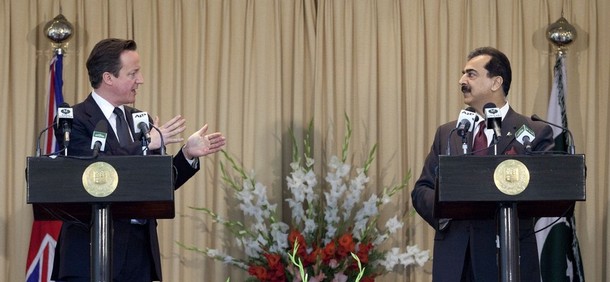
The writing on the wall was clear when the British Prime Minister David Cameron visited Pakistan. The main agenda of the prime minister’s visit was to repair the soured relations between Britain and Pakistan.
The relations dipped last year during the last visit of British Prime Minister to India when he lambasted Pakistani government for its ambivalent policy with regard to export of terror to India, Afghanistan and elsewhere. He said: "We cannot tolerate in any sense the idea that this country(Pakistan) is allowed to look both ways and is able, in any way, to promote the export of terror, whether to India or whether to Afghanistan or anywhere else in the world.”
After a gap of eight months, the prime minister arrived in Pakistan and stated he wanted to start fresh, build trust and put the relations between the two countries on a new footing. He announced aid to expand Pakistan’s poor education infrastructure by providing $1.1 billion in aid to that country to help build schools, buy textbooks and train teachers. In fact, the prime minister praised Pakistan in tackling terrorism in Asia and elsewhere.
Britain is part of the America led NATO coalition in Afghanistan. The coalition’s dependence on Pakistan is quite obvious. Besides reliance on intelligence sharing for its operations against extremists on either side of the Durand line with Pakistani army, Pakistani territory is a transit route for meeting coalition’s logistical requirements in Afghanistan through the port city of Karachi. However, Britain dependence on Pakistan goes beyond Afghanistan and is rooted in Britain’s domestic problems. The vast majority of Britain’s 1.6 million Muslims are from South Asia( around one million, two-thirds of whom are from Pakistan, less than one-third from Bangladesh and the remainder from India). Many of Britain’s political heavyweights are elected from constituencies that have a large presence of first generation or second generation migrants known as Pakistani diaspora. The lone Muslim cabinet minister in the British cabinet is a lady of Pakistani origin.
It is lesser known fact that the bulk of the community commonly known as Pakistani diaspora is actually from Pakistan-administered Jammu and Kashmir, a region severed from the rest of Jammu and Kashmir, which is with India. In reality, apart from colonial linkages, the British connection with South Asian diaspora dates back a century to a time when the first batch of migrants from the present day Pakistan-administered Jammu and Kashmir (PAJK) first reached its shores. These were the sea men of the ships sailing between Britain and then British India. The second wave of migration followed after the construction of the Mangla dam in the mid-1960s during the reign of Pakistani President Ayub Khan. Around 81000 people are stated to be impacted by the dam. A century later since the first wave of migration began, half a million British citizens had direct or indirect links with PAJK due to ancestry, ethnicity or kinship. By the 1980’s, over 50 percent of Pakistan’s foreign exchange earnings came from PAJK diaspora.
On July 18 2008, according to Wikileaks, a senior British official (Laura Hickey),told the Americans that ‘stabilizing Kashmir is important for UK’s domestic security reasons.’ The British fears are grounded in the fact that some young members of the diaspora, during visits to Pakistan and PAJK, have often been in touch with militant outfits based in J&K. British youth, who were involved in the 7/7 suicide attacks in 2005, had ancestral roots in PAJK and British officials have often expressed concern over the potential threat of extremist violence from certain members of the community. A year later, a plot to blow up ten United States-bound flights from Heathrow with the help of liquid explosives was revealed on 10 August 2006. British and Pakistani intelligence agencies jointly exposed the plot that led to the arrest of the alleged mastermind, twenty seven year old Rashid Rauf, a supposed Al-Qaeda operative. His father had immigrated to Britain from Mirpur area of Pakistan-administered Jammu Kashmir. Rauf was married to a relative of Bahawalpur resident, Maulana Masood Azhar, founder of the Jaish-e-Mohammad, a leading J&K centric extremist group in Pakistan. The infamous case of Omar Sheikh, British citizen of Pakistani ethnicity, is another example of this pattern.
A greater intelligence sharing is one of the main British foreign policy objectives in Pakistan as many of the British security concerns have a Pakistani linkage. This is explained the fact that Mr. Cameron was accompanied on his trip by John Sawers, head of the country’s Secret Intelligence Service(MI6). He was visiting Pakistan for the second time in less than a month. British foreign policy in South Asia aims to benefit from India’s burgeoning economic clout and also desires cooperation with Pakistan in securing its domestic security interests.
Luv Puri is a political analyst, who has written two books on South Asian political and security issues. His latest book " Across the LOC" based on field work in Pakistan and Pakistan-administered Kashmir has a chapter on diaspora settled in Britain. Photo credit: Reuters.
Image: cameron_gilani.jpg
